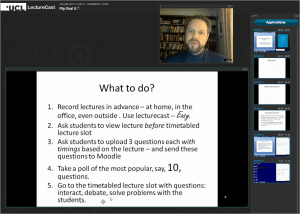Forward flip
By Clive Young, on 13 June 2013
 One of the most surprising (and pleasing) e-learning phenomena at UCL over the last year has been the rapid rise and adoption of the term ‘flipping‘.
One of the most surprising (and pleasing) e-learning phenomena at UCL over the last year has been the rapid rise and adoption of the term ‘flipping‘.
Flipping involves an interesting redesign of ‘traditional’ teaching. Students are asked to view and sometimes comment on a short video online to prepare for a tutorial or seminar. The idea is they then come to the live event immediately ready to discuss in more depth the issues raised or apply those ideas in practical problem solving or group work supported by the academic. The videos can be all or part of a recorded lecture or be specially prepared using for example a narrated Powerpoint presentation. They can be supported by many kinds of online resources such as e-readings and quizzes.
Although the idea has been around since at least 2006, used by Eric Mazur at Harvard and others, the US high school teachers Jon Bergmann and Aaron Sams are often credited with starting the movement. In the UK the idea received a boost in a prophetic 2010 Daily Telegraph article by Daniel Pink on ‘flip thinking’, but it was Salman ‘Kahn Academy’ Khan mentioning “teachers flipping the classroom” in his 2011 TED Talk “Let’s Use Video to Reinvent Education that popularised the whole concept. The influential Wired magazine then accredited flipping as a key trend in an excellent 2012 article University just got flipped: how online video is opening up knowledge to the world which itself forecast the rapid rise of the MOOC.
The idea of getting students to prepare properly for tutorials is hardly new and as the e-learning blogger Steve Wheeler pointed out at the time (What the flip, 2012), there may be risks involved if incomplete flipping perpetuates old ‘instructional’ models. He presented an attractive notion though that “Flipping learning for me means teachers becoming learners and students becoming teachers” which seems the logical ‘next step’ for flipping, an idea I will return to in a later blog post.
One of UCL’s great advocates of flipping is of course Carl Gombrich, Programme Director, Arts and Sciences (BASc) who flipped extensively from the outset of his Approaches to Knowledge course to engage students in cross-disciplinary discussion. Carl explains his approach earlier this academic year in his blog post Flipping lectures – reflections on a term of learning.
Carl also featured in a recent Times Higher Education / Echo 360 webinar E-Learning to Active Learning: Transforming the Learning Environment along with ELE’s Steve Rowett and myself where we explained UCL’s innovative approach The recording can be accessed simply by registering on the site. Carl uses the UCL desktop recording (EchoCapture Personal) software, part of Lecturecast, to create his video segments.
In the presentation Carl highlights some of the ‘good things’ about flipping:
- Students can interact with lecturers on questions that interest them/problems they want to work through.
- Students/lecturers get better relationships in terms of mentoring/personal contact etc.
- Active learning: lecture times can be used for summative assessments: short tests, blog pieces, group work, debates.
As we speak to academic colleagues, E-Learning Champions and departmental committees across UCL we are beginning to realise just how many people are interested in flipping as a way to explore new forms of teaching and learning and the Times Higher Education / Echo 360 webinar is a great place to start.
 Close
Close

